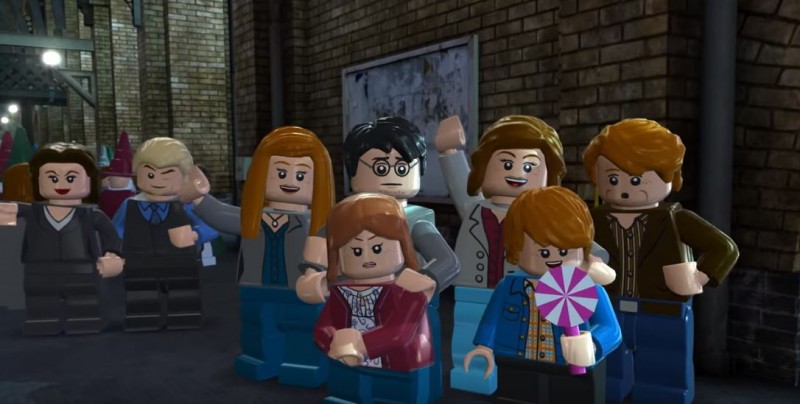
As today is his birthday, The Boy Who Lived has now lived to the age of 39, and what better way to celebrate the magical hero’s big day than with some magical games based on his adventures?! Harry Potter games have had a tumultuous history, so let’s spin a few Time Turners and revisit its highs and lows.

The console movie tie-ins
For each of the eight movies in the Harry Potter series, there has been a game adaptation of the same name. These offerings on console occasionally offer experiences with some depth. More often, however, many of them seemed to ride on the popularity of their film counterparts, expecting success based on the brand name alone. While they vary in quality, most of the games at least do a serviceable attempt at letting fans of the franchise interact with the characters and locations they’ve come to love.

The portable movie tie-ins
Often overlooked in favor of their console counterparts, Harry Potter’s portable entries were developed by different studios. As such, they often vary wildly from the console versions, with some versions exceeding the console versions in quality. When we reviewed The Prisoner of Azkaban, for example, we gave the PS2 version an unflattering, but not damning, 6.5, whereas its GBA counterpart received an impressive 8/10. This divide in score is in part thanks to the GBA version’s emphasis on RPG mechanics, which gave the Hogwarts setting a new and refreshing flavor. These portable offerings are therefore much like Hufflepuff: They’re often ignored or dismissed, but if you give them a chance, you might find some real gems.
Click here to watch embedded media
Wonderbook: Book of Spells
Among Harry Potter’s more experimental game offerings, Wonderbook: Book of Spells acted as a showcase for augmented reality. It used the PS3’s PlayStation Eye and Move controllers – along with an actual, physical book – to make it look as if any number of magical things were occurring on the screen. Unfortunately, Book of Spells (and its successor, Book of Potions) served more as tech demos than actual games. There’s still some appeal for those who love to dig into the franchise’s lore, but for most others, it’ll be a pretty shallow experience.

Harry Potter for Kinect
As Sony was experimenting with the PlayStation Eye, Microsoft was experimenting with the Xbox Kinect. Among the series to receive an adaptation for the body-tracking peripheral, the aptly named Harry Potter for Kinect was a collection of minigames where players shifted their bodies and waved their hands, trying to reenact iconic scenes or cast popular spells with the Kinect’s voice recognition. Unfortunately, developers Eurocom didn’t brew up a winner, instead creating a buggy mess that served as a novelty at best.

Lego Harry Potter
The Lego games often build fun, easily accessible movie adaptations where others fail, and it was no exception when developer Traveller’s Tales got its hands on the Harry Potter franchise. The level-based mission structure was kept in place from previous Lego games, but the entire castle of Hogwarts, among other locations such as Diagon Alley and Hogsmead, became explorable, with hidden secrets and collectibles scattered across its many halls. Add to this an extensive list of playable characters and functional spells that unlock as you progress, plus a wacky sense of humor, and the Lego Harry Potter games serve as some of the brightest of the bunch.

Harry Potter: Hogwarts Mystery
In recent years, new Harry Potter games mostly release on mobile platforms, and 2018’s Hogwarts Mystery showed promise for having an original and engaging story, with many of the film’s actors reprising their roles. However, what might have been a fun addition to the Harry Potter franchise was marred by aggressive microtransaction practices that didn’t fit with the game’s narrative structure. Like Gilderoy Lockhart, it may be attractive on the surface, but looks can be deceiving.

Harry Potter: Wizards Unite
The most recent Harry Potter game, Wizards Unite was developed by Niantic of Pokémon GO fame, and follows a similar structure. Players go out into the real world, using their phones’ GPS tracking to find magical beasts, stopping by inns, greenhouses, and fortresses to heal, craft potions, and battle. While clearly derivative of Pokémon GO, the game iterates upon many of GO’s ideas, all while delivering a fun experience for Harry Potter fans to come together and enjoy.
While the original septilogy of novels is long-concluded, game developers still dust off the Harry Potter brand every once and a while, for better or worse. Last year we saw leaked footage that appeared to be an impressive-looking console Harry Potter game, so hopefully Harry’s next adventure does the property justice. One thing is certain: We definitely haven’t seen the last of The Boy Who Lived in video games.
Source: Game Informer Charting Harry Potter's Rocky Gaming History

